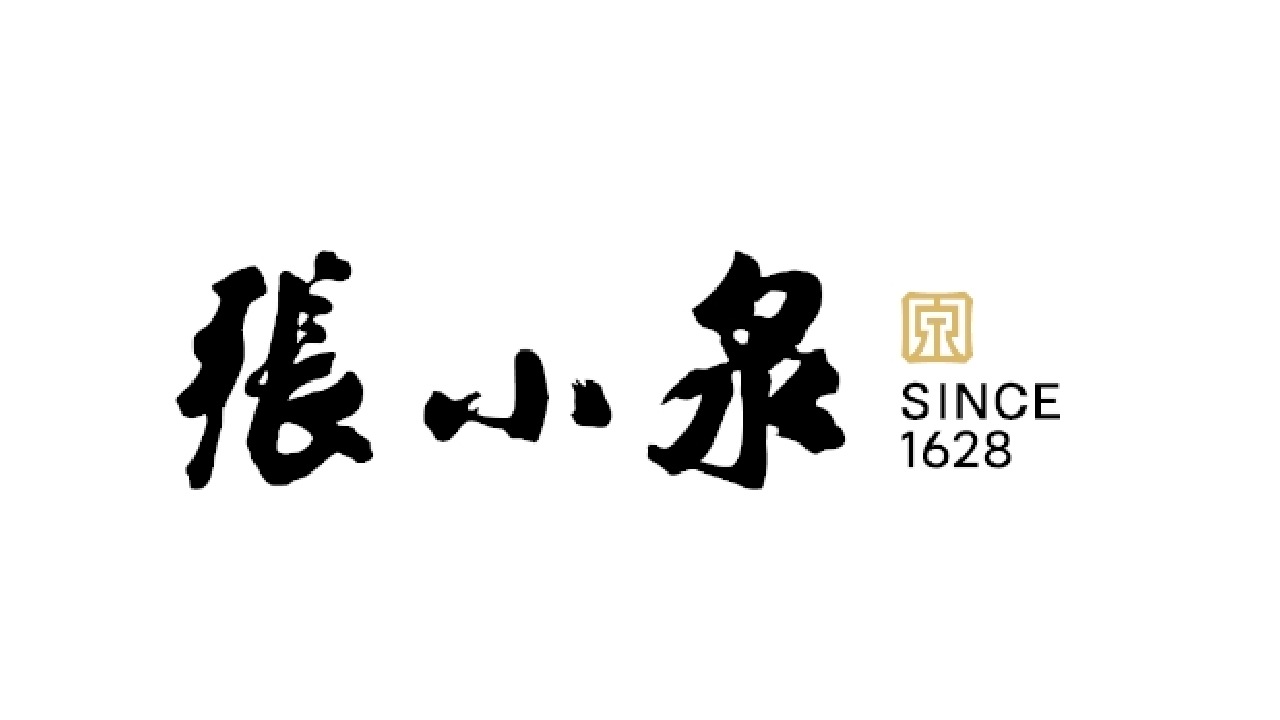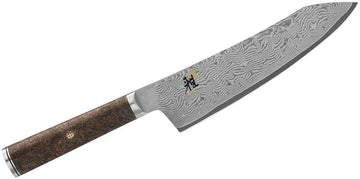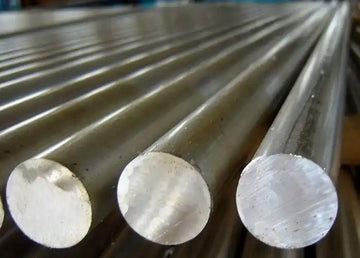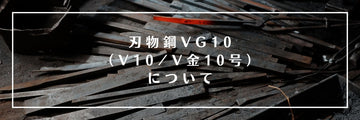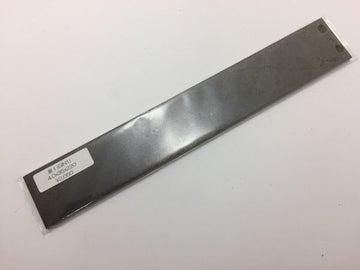MC66 is a special name that Zwilling J.A. Henckels uses for ZDP-189 steel in their Miyabi knives. This steel is one of the hardest materials used in kitchen knives today. While most knife steels try to balance different qualities, MC66 focuses primarily on extreme hardness and keeping a sharp edge for a very long time.
Where MC66 Steel Comes From
Hitachi Metals in Japan developed ZDP-189 steel in the late 1990s. They wanted to create a steel that would stay sharp much longer than anything else available. Zwilling later adopted this steel for their high-end Miyabi knife lines, particularly the 6000MCT and 7000D series, but renamed it MC66.

What makes this steel special is its unusually high carbon content - about 3%, which is three times more than what you'd find in most premium kitchen knives. This high carbon level creates a steel that can get incredibly hard but requires special care.
What's in MC66 Steel
MC66 contains an interesting mix of metals:
- Carbon (3.0%): This extremely high amount allows the steel to reach impressive hardness levels
- Chromium (20%): While this would normally make a steel very rust-resistant, much of it combines with carbon instead
- Molybdenum (1.4%): Helps the steel achieve higher hardness during heat treatment
- Vanadium (0.1%): Keeps the grain structure fine and uniform
The way these elements combine creates a steel with many tiny, hard particles (called carbides) throughout. These carbides are what help the edge stay sharp for so long, especially when cutting through food.
How MC66 Steel Performs
Hardness and Edge Retention
After special heat treatment that includes freezing the steel to very low temperatures, MC66 reaches a hardness of 66-67 HRC (Rockwell hardness scale). For comparison, most good kitchen knives range from 56-61 HRC. In cutting tests, MC66 stays sharp about 2.6 times longer than standard 440C stainless steel. A knife made with this steel can cut through hundreds of onions before needing sharpening.

Rust Resistance
Despite having 20% chromium (the element that prevents rust), MC66 has only moderate rust resistance. This is because much of the chromium is tied up with carbon, leaving less available to protect against rust. The steel won't rust immediately if you forget to dry it, but it requires more careful maintenance than many other stainless steels.
Toughness
The trade-off for MC66's extreme hardness is lower toughness. It's about 40% more brittle than many other premium knife steels. This is why Miyabi designs their MC66 knives with specific edge angles (not too thin) and adequate thickness to prevent chipping. These knives aren't made for heavy chopping or cutting through bones.
How MC66 Knives Are Made
Powder Metallurgy
MC66 is made using a special process called powder metallurgy. The metal is first converted into tiny powder particles, which are then compressed under high heat and pressure. This creates a very uniform metal structure with evenly distributed carbides - something impossible to achieve with traditional steel-making methods.
Heat Treatment
Miyabi uses a careful heat treatment process for their MC66 knives:

- Heating the steel to about 1,080°C
- Quenching it in oil
- Freezing it to extremely low temperatures
- Heating it again at lower temperatures to relieve stress
This process ensures the steel reaches its maximum potential hardness while minimizing internal stresses that could cause problems later.
Surface Treatments
To improve the steel's performance, manufacturers:
- Polish the surface to remove surface irregularities
- Sometimes, apply special coatings to improve corrosion resistance
- Create textures that help prevent food from sticking to the blade
How MC66 Steel Works in the Kitchen
What It's Great For
MC66 excels at precision cutting tasks:
- Slicing vegetables incredibly thin and cleanly
- Filleting fish with minimal waste
- Making ultra-precise cuts for presentation
- Maintaining sharpness through long prep sessions
A professional chef can slice hundreds of onions with an MC66 knife and still have it performing well, when other knives would have dulled significantly.
Where It Struggles

This steel isn't ideal for all kitchen tasks:
- It can chip if used on hard foods like frozen items
- It's not good for cutting through bones or hard shells
- It may break if bent sideways with force
- It requires more careful maintenance than other knives
How MC66 Compares to Other Knife Steels
When comparing MC66 (ZDP-189) to other premium knife steels, you'll notice significant differences in performance and characteristics.
MC66 vs. VG-10
MC66 is considerably harder than VG-10, reaching 66-67 HRC compared to VG-10's 60-61 HRC. This extreme hardness gives MC66 exceptional edge retention - it will stay sharp roughly 35% longer than VG-10 in typical kitchen use. However, VG-10 has better corrosion resistance, making it more forgiving if you occasionally leave it wet. VG-10 is also tougher and less prone to chipping, making it more suitable for all-purpose kitchen work. When it comes to sharpening, VG-10 is noticeably easier to sharpen than MC66, which requires more skill and better equipment.
MC66 vs. S90V
Both MC66 and S90V are considered "super steels," but they achieve their performance differently. MC66 reaches higher hardness levels (66-67 HRC vs. S90V's 58-60 HRC), but S90V actually maintains its edge better in abrasive cutting tests due to its vanadium-rich composition. S90V offers somewhat better corrosion resistance than MC66, though neither matches standard stainless steels. In terms of toughness, S90V is moderately tougher than MC66, making it less prone to chipping under stress. Both steels are challenging to sharpen, with S90V being particularly difficult due to its vanadium carbides.
MC66 vs. SG2/R2
SG2 (also known as R2) is another powder metallurgy steel that competes with MC66. SG2 typically reaches a hardness of 62-64 HRC, which is impressive but still below MC66's 66-67 HRC. In edge retention, SG2 performs excellently but doesn't quite match MC66's extreme performance. Where SG2 shines is its balance: it offers significantly better corrosion resistance than MC66, and its toughness is notably superior, making it less prone to chipping. SG2 is also somewhat easier to sharpen, though still challenging compared to conventional steels. Many experts consider SG2 to hit a "sweet spot" for high-end kitchen knives, balancing extreme performance with better practicality.
How to Care for MC66 Knives
Because of this steel's unique properties, it needs special care:
- Cleaning: Wash by hand with mild soap, never in a dishwasher
- Drying: Dry thoroughly immediately after washing
- Storage: Store in a knife block, sheath, or on a magnetic rack
- Maintenance: Use a leather strop with fine diamond paste for regular edge maintenance
- Sharpening: Use high-quality waterstones (800-3,000 grit) and maintain a consistent angle
Professional chefs find that regular light maintenance (weekly touch-ups) helps these knives perform at their best for longer periods.
Future Improvements
Knife makers are working on ways to make MC66 even better:
- Combining MC66 with outer layers of more corrosion-resistant steel
- Using laser treatments to increase the steel's toughness
- Applying special coatings to improve rust resistance
- Creating knives with MC66 edges but more flexible steel for the rest of the blade
These innovations might address some of the steel's current limitations.
Conclusion
MC66/ZDP-189 represents the extreme end of kitchen knife hardness. It offers unmatched edge retention for precision cutting tasks, but requires care and skill to use properly. It's like a high-performance sports car - more demanding than everyday vehicles, but capable of exceptional performance in the right hands.
These knives aren't for everyone. They're best suited for professional chefs and serious home cooks who:
- Value edge retention above all else
- Are willing to maintain their knives properly
- Use proper cutting technique
- Don't mind paying a premium price
For these users, MC66 knives offer cutting performance that conventional steels simply can't match.
FAQs
What is MC66 Steel?
MC66 Steel is Zwilling J.A. Henckels' proprietary name for ZDP-189 steel, used in their premium Miyabi knife lines. It's a powder metallurgy stainless steel featuring an extraordinarily high carbon content (3%) and chromium (20%). This composition allows it to achieve extreme hardness and exceptional edge retention, making it one of the hardest kitchen knife steels commercially available today.
Is MC66 Steel of good quality?
Yes, MC66 Steel is of exceptional quality. It represents the high-end of knife steel technology, offering hardness ratings of 66-67 HRC and outstanding edge retention that far surpasses conventional knife steels. Its powder metallurgy production ensures uniform carbide distribution and consistent performance. While it requires more careful maintenance than other steels, its cutting performance is among the best available in the kitchen knife market.
What is MC66 Steel equivalent to?
MC66 Steel is equivalent to ZDP-189 steel, as MC66 is simply Zwilling's brand name for this material. There are no other direct equivalents with identical properties, though some powder metallurgy steels like HAP40 and S110V offer somewhat similar extreme hardness and edge retention characteristics. MC66/ZDP-189 stands apart due to its unique combination of ultra-high carbon content (3%) and high chromium (20%).
Is MC66 Steel a good knife steel?
Yes, MC66 Steel is an excellent knife steel for specific uses. It excels in applications where edge retention is the primary concern, such as precise slicing and detail work. Its extreme hardness (66-67 HRC) allows it to maintain sharpness far longer than conventional steels. However, it's not ideal for all purposes - it's somewhat brittle compared to softer steels and requires careful use and maintenance. For users who prioritize cutting performance and are willing to provide proper care, MC66 is among the best knife steels available.
What is the difference between MC66 Steel and ZDP-189?
There is no difference between MC66 Steel and ZDP-189 - they are the same steel. MC66 is simply Zwilling J.A. Henckels' marketing name for ZDP-189, which was developed by Hitachi Metals in Japan. When you purchase a Miyabi knife with MC66 steel, you're getting a blade made from ZDP-189. The composition, properties, and performance are identical.
MC66 Steel vs. VG-10
MC66 Steel is significantly harder than VG-10 (66-67 HRC vs. 60-61 HRC) and offers superior edge retention, maintaining sharpness about 35% longer in typical use. However, VG-10 has advantages in practical use: it's more corrosion-resistant, considerably tougher and less prone to chipping, and much easier to sharpen. VG-10 is more forgiving of rough use and improper cutting technique. MC66 provides exceptional cutting performance but requires more care, while VG-10 offers good performance with better all-around practicality and lower maintenance requirements.
MC66 Steel vs. SG2/R2
MC66 Steel achieves higher hardness than SG2/R2 (66-67 HRC vs. 62-64 HRC) and offers somewhat better edge retention. However, SG2 provides a more balanced performance profile. SG2 offers significantly better corrosion resistance, superior toughness (less prone to chipping), and is easier to sharpen while still maintaining excellent edge retention. Many knife experts consider SG2 to hit a "sweet spot" for high-end kitchen knives, balancing premium performance with better practicality than the more extreme MC66 steel.
Can MC66 Steel rust?
Yes, MC66 Steel can rust despite its high chromium content (20%). This is because much of the chromium combines with carbon to form carbides, leaving less free chromium available to form the protective oxide layer that prevents corrosion. While it has moderate corrosion resistance and won't rust immediately if exposed to moisture, it's less rust-resistant than many common stainless steels. To prevent rusting, MC66 knives should be washed and dried promptly after use, especially after contact with acidic foods, and stored in a dry environment.
How hard is MC66 Steel?
MC66 Steel reaches an extreme hardness of 66-67 HRC (Rockwell C scale), making it one of the hardest kitchen knife steels commercially available. For comparison, most kitchen knives typically range from 55-61 HRC. This exceptional hardness contributes to its outstanding edge retention but also makes it more brittle than softer steels. The high hardness is achieved through careful heat treatment that includes cryogenic processing to maximize martensitic transformation and minimize retained austenite.
Is MC66 Steel good for chef knives?
MC66 Steel can make excellent chef knives for certain users and situations. Its extreme edge retention excels in professional environments with extensive food prep where constant resharpening would be inconvenient. It performs exceptionally well for precise slicing and detail work. However, it's not ideal for all chef knife applications - its brittleness makes it less suitable for tasks involving bones, frozen foods, or rough cutting techniques. MC66 chef knives are best for skilled users who appreciate exceptional cutting performance and are willing to use proper technique and maintenance.
How to sharpen MC66 Steel?
Sharpening MC66 Steel requires specific techniques due to its extreme hardness (66-67 HRC). Use high-quality water stones starting with medium grits (800-1000) for edge setting, progressing to fine stones (3000-6000) for polishing. Diamond stones work well but must be high quality. Maintain a consistent angle (typically 15-17° per side) and use light pressure with slow, deliberate strokes. Between full sharpenings, maintain the edge with a leather strop loaded with fine diamond compound (0.5-1 micron). Regular light maintenance prevents the need for major resharpening sessions. Be patient - MC66 takes longer to sharpen than softer steels but rewards the effort with exceptional edge retention.
